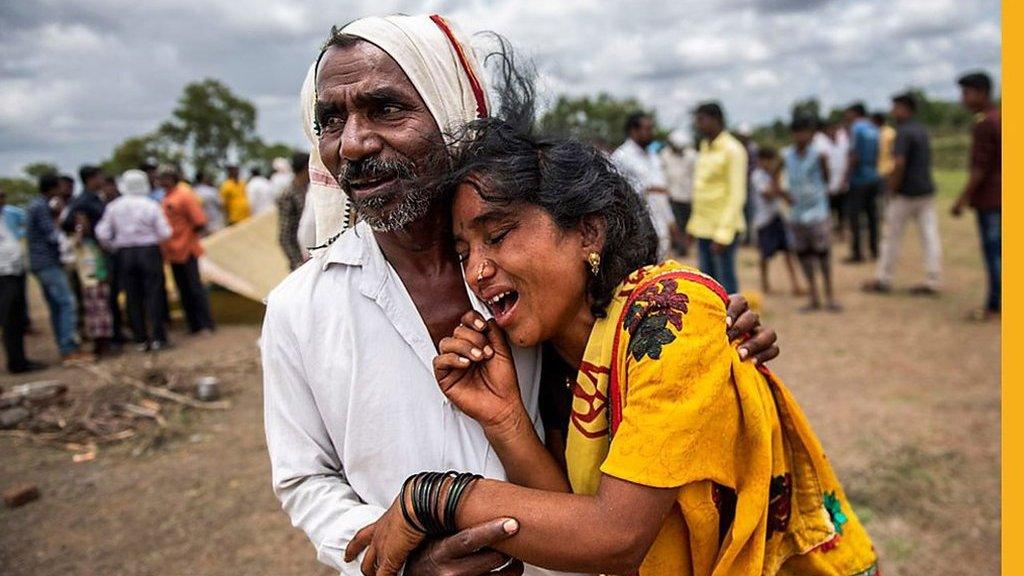A year in fake news in Africa
- Published

The spread of fake news in Africa has been blamed for igniting ethnic violence, sowing confusion among voters and even causing currency fluctuations. As the BBC launches major new research into fake news in Africa, we break down five false stories that made a big impact on the continent in the past 12 months.


1. Nigerian presidential candidate 'endorsed by gay rights groups'
What was the story?
When Atiku Abubakar was confirmed as a presidential candidate for the Nigerian elections in 2019, a fake Twitter account in the name of the opposition leader posted a message thanking the "Association of Nigerian Gay Men (ANGAM)" for its support.

Allow X content?
This article contains content provided by X. We ask for your permission before anything is loaded, as they may be using cookies and other technologies. You may want to read X’s cookie policy, external and privacy policy, external before accepting. To view this content choose ‘accept and continue’.

In the post, "Mr Abubakar" writes that the first thing he would do if he were to become president would be to scrap the country's controversial anti-gay legislation, signed into law by former Nigerian President Goodluck Jonathan in 2014.
Homosexual acts are punishable by up to 14 years in jail in Nigeria, while gay marriage and displays of same-sex affection are also banned.
What impact did it have?

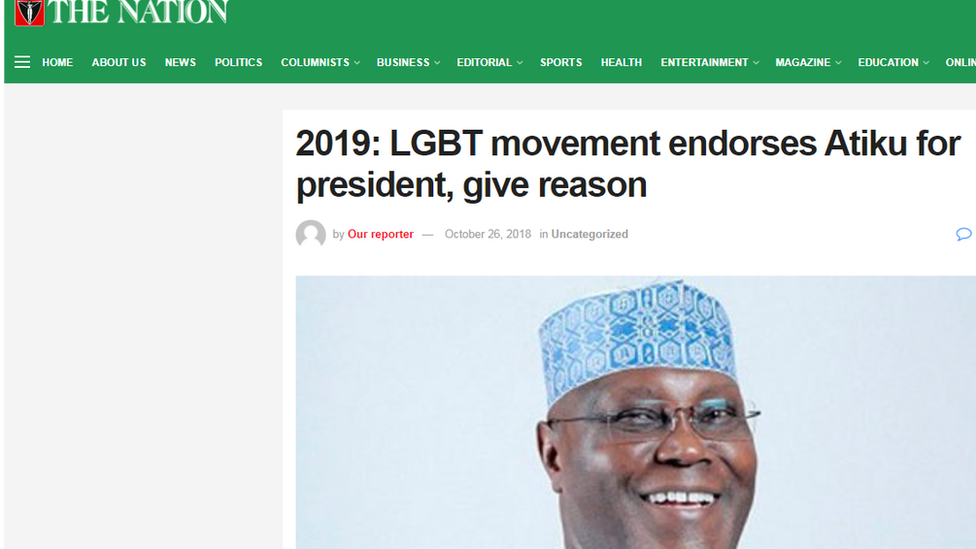
A screengrab of the fake news story from a Nigerian blog

After originally being shared on Twitter on 14 October, the story was picked up by two Nigerian blogs. Then 12 days later, two prominent Nigerian newspapers, The Nation, external and the Vanguard, external, both published stories with a very similar theme.
They reported that an LGBT organisation called "Diverse" was also backing Mr Abubakar for president, considering him a truly "liberal candidate".
A fake news story about a presidential candidate advocating for gay rights could be used to undermine them. Highly influential Muslim and Christian leaders in Nigeria, who were united in their support for the anti-gay legislation, could tell their followers not to vote for such a candidate.
How do we know the story was fake?
The Twitter account which was the source of the original story is not an official account for the politician Atiku Abubakar. This is his real account, external, verified with a blue tick by Twitter.
Fake news is often published on legitimate-looking websites
There is also no evidence that the LGBT rights organisations quoted in the initial tweet, or the subsequent blogposts and newspaper articles, even exist. There are no official records of the organisations themselves, which would be illegal under Nigerian law anyway.
And neither they nor their purported spokesperson (Spinky Victor Lee) existed online before the emergence of the first tweet in October, as detailed in this fact-check, external by the Agence France Press (AFP) news agency.


2. Top Kenya media personality shares fake praise
What was the story?
CNN business presenter Richard Quest was in the Kenyan capital Nairobi in October filming for his TV show.
Former news anchor and media personality Julie Gichuru posted on her Twitter account on 25 October to discuss how much Mr Quest was apparently enjoying his time in Kenya.
She posted the following quote, attributing it to Mr Quest.
"Nothing beats the service industry in Kenya... Here I am surrounded by giraffes while having breakfast! In a country declared by the World Bank as the Preferred Investment Destination in Africa, what else can I ask for? KENYA IS MAGICAL!"

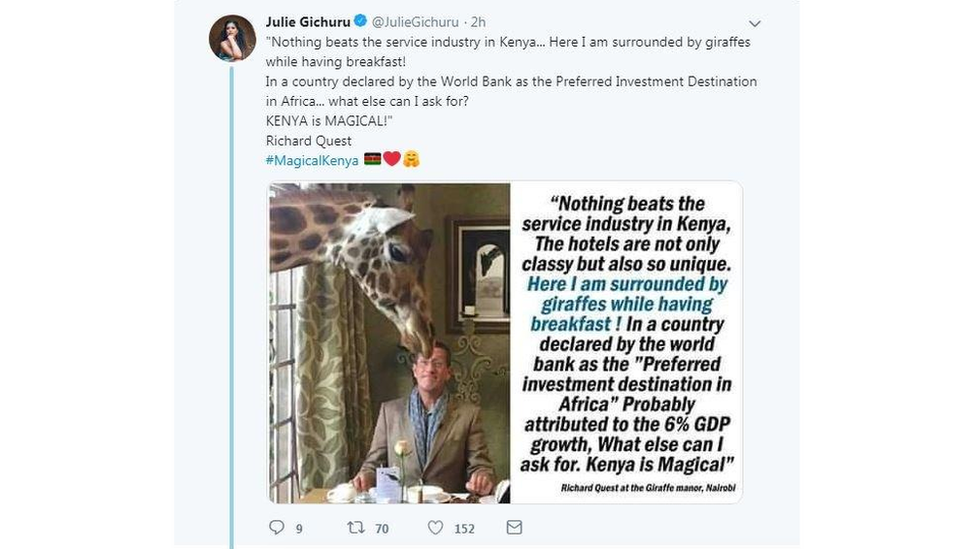

What impact did it have?
Julie has over a million followers on her verified Twitter account and 600,000 on Instagram, so within minutes thousands of people had seen what she had posted and believed it to be true.
Many poked fun at her for falling for a hoax given her high profile and her long career in the media industry.
How do we know the story was fake?
The CNN journalist came across Julie's tweet and was quick to point out that he hadn't made any such statement. He replied to her original post.

Allow X content?
This article contains content provided by X. We ask for your permission before anything is loaded, as they may be using cookies and other technologies. You may want to read X’s cookie policy, external and privacy policy, external before accepting. To view this content choose ‘accept and continue’.

Ms Gichuru then had to go on Twitter to set the record straight to her followers, issuing a retraction and deleting her initial tweet.

Allow X content?
This article contains content provided by X. We ask for your permission before anything is loaded, as they may be using cookies and other technologies. You may want to read X’s cookie policy, external and privacy policy, external before accepting. To view this content choose ‘accept and continue’.


3. Somalis 'pushed into shallow grave' in Ethiopia
What was the story?
In July, the US-based Ethiopian Satellite Television (ESAT) station broadcast a video which it said showed ethnic Oromos in Ethiopia pushing the bodies of ethnic Somalis into a shallow grave.
It claimed that the footage was taken in Ethiopia's Oromia region, where there has been deadly violence between the two groups this year.
What impact did it have?

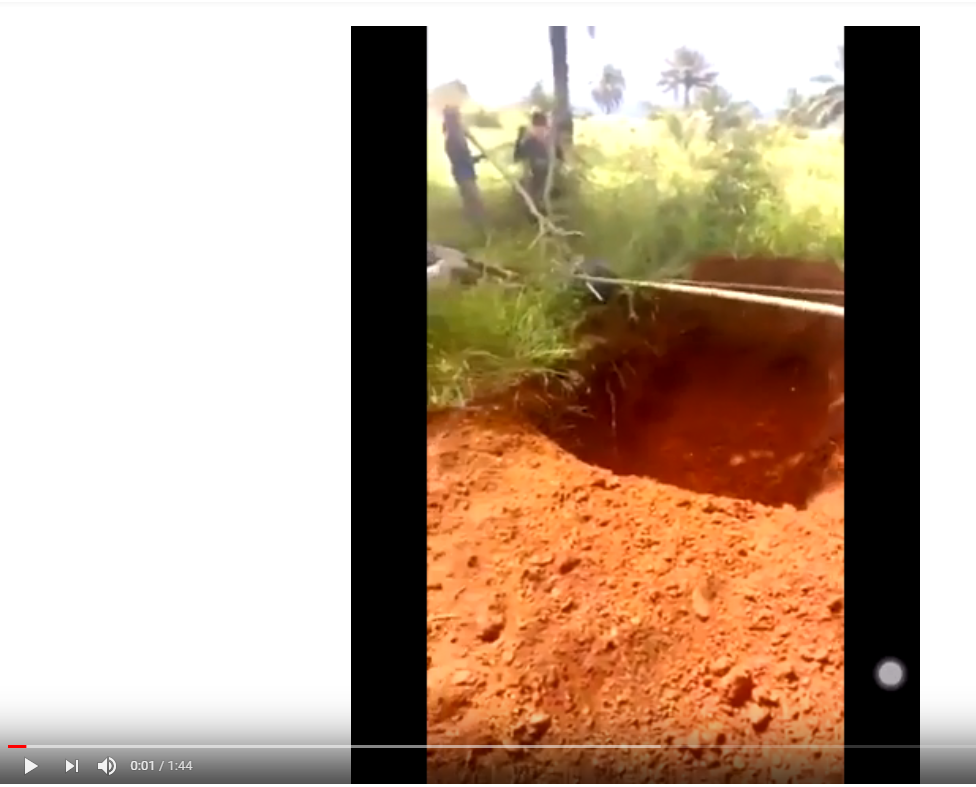
The film showed bodies being rolled into a shallow grave

The BBC's Afaan Oromo language service reported that the widespread circulation of the video on social media in Ethiopia resulted in deadly attacks on ethnic Oromo people living in neighbouring Djibouti and Somalia.
Oromo refugees in neighbouring Djibouti told the BBC that they had been beaten and their shops looted because of the video.
How do we know it was fake?
The same unverified video was first shared in Cameroon, some 3,000km (1,800 miles) west of Ethiopia, in June, when it was said to relate to the current conflict between Anglophone separatists and the government.
The version of the video which aired on ESAT TV without being verified had apparently also been doctored, with audio of what were supposedly Oromo youths chanting inserted on top of the video's original sound.
As soon as it realised the video was fake, ESAT removed it from its platforms and issued an official apology, external on its YouTube channel.
There is no suggestion that ESAT TV doctored the video or broadcast it knowing it was fake.
Correction 23 November: This article has been updated to make it clear that ESAT TV was not responsible for doctoring the footage, or that it knowingly broadcast a fake video.


4. South African President Jacob Zuma's "resignation"
What was the story?
On 12 February, a correspondent for South Africa's national broadcaster SABC reported, external that then-President Jacob Zuma had agreed to resign.
Citing "authoritative sources", Tshepo Ikaneng broke the story during a live report outside a high-level meeting of members from the ruling African National Congress (ANC), who were discussing his future.
Another South African journalist uploaded the announcement on Twitter.

Allow X content?
This article contains content provided by X. We ask for your permission before anything is loaded, as they may be using cookies and other technologies. You may want to read X’s cookie policy, external and privacy policy, external before accepting. To view this content choose ‘accept and continue’.

Mr Zuma had been under immense pressure over multiple corruption scandals and had faced repeated calls from his party to step down.
The country was waiting on news of his possible resignation.
What impact did it have?
The South African rand, which had gained about 1% on the expectation that Mr Zuma would resign on 12 February, gave up some of its gains after the spokesman dismissed the SABC report.

Allow X content?
This article contains content provided by X. We ask for your permission before anything is loaded, as they may be using cookies and other technologies. You may want to read X’s cookie policy, external and privacy policy, external before accepting. To view this content choose ‘accept and continue’.

Do we know it was fake?
Mr Zuma's spokesperson came out to deny the reports, external, saying they were "fake news".
But three days later, Mr Zuma resigned - this time for real.


5. Tanzanian leader 'backs polygamy to end prostitution'

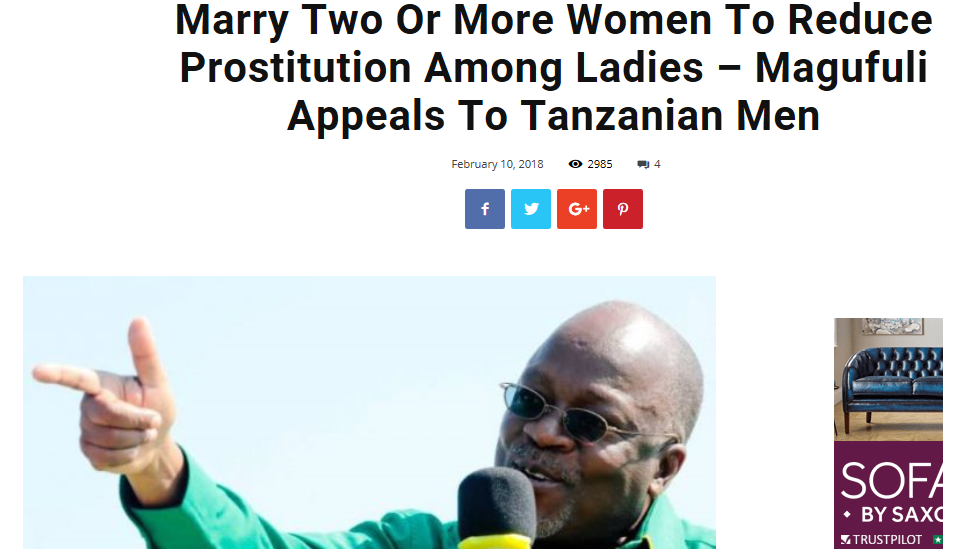

What was the story?
An article claiming Tanzanian President John Magufuli had told men to marry more than one wife as a way to end prostitution went viral.
It said that the president had addressed a "conference of about 14,000 men" telling them that "out of approximately 70 million Tanzanians, 40 million are women and only 30 million are men."
This scarcity of men was leading to an increase in prostitution and adultery among women, the article claimed the president had said.
What impact did it have?
The initial story published in the English language Zambia Observer website in February 2018 didn't create much of a stir.
But it was only when it was published in Swahili, the national language of Tanzania, on a website called nipasheonline.com that the story really started to gain momentum.
From there it was posted on the popular JamiiForums website, where it became a hot topic of discussion and spread to other news websites in Kenya, Zambia, South Africa and Ghana.
How do we know it was fake?
Tanzania's official government spokesperson condemned the story on Twitter, external in Swahili, saying the president never uttered such remarks and people should ignore them.
A fact-check by BBC Swahili exposed further reasons we know the article was untrue.
In the fake article, "Mr Magufuli" refers to a population of 70 million, with 10 million more women than men.
But the latest UN estimates, external put the total population of Tanzania at just under 60 million, with no substantial gender disparity.
The website where the fake article was posted may also have sounded familiar to readers of the prominent Tanzanian newspaper Nipashe.
But it has no connection to the real website for that newspaper, whose official home on the web is https://www.ippmedia.com/sw/nipashe, external.


This story is part of a series by the BBC on disinformation and fake news - a global problem challenging the way we share information and perceive the world around us.
To see more stories and learn more about the series visit www.bbc.co.uk/beyondfakenews

- Published12 November 2018
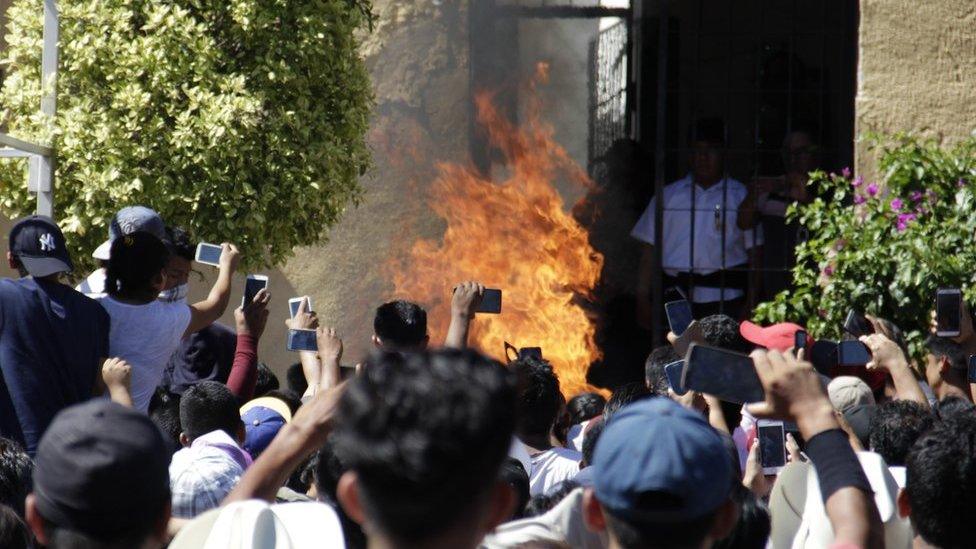
- Published12 November 2018
